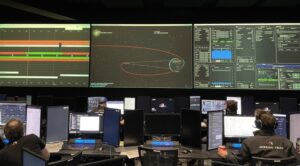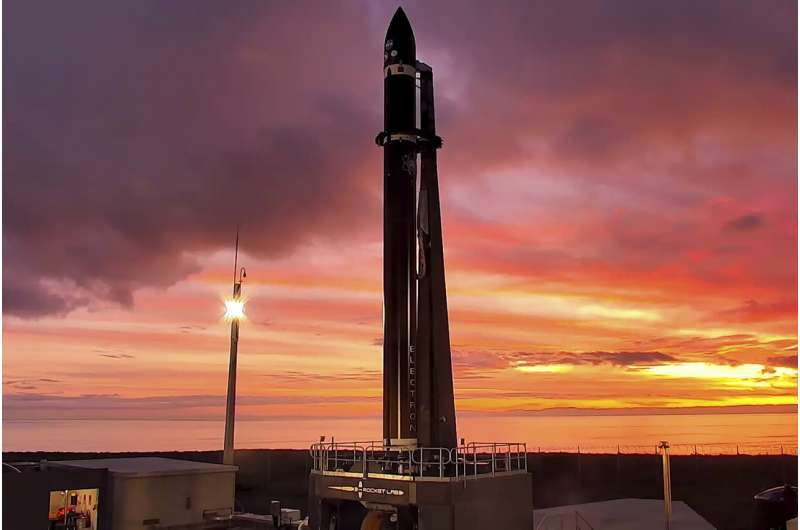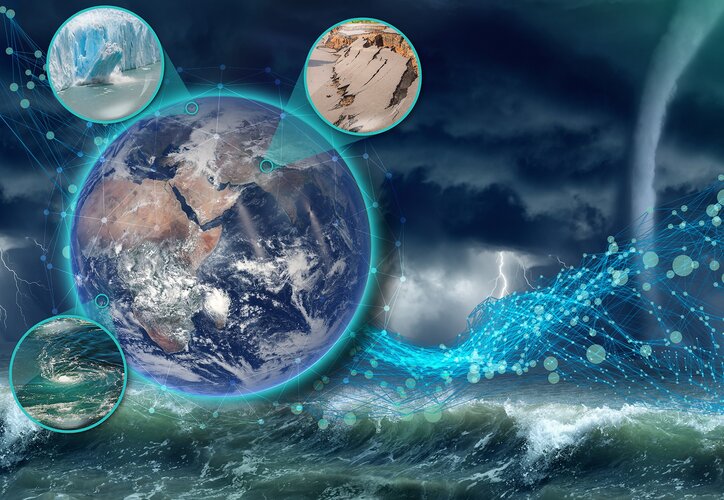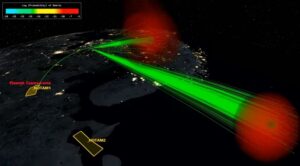CAPSTONE heads to the moon
Monday, 04 July 2022 12:23
A NASA-funded lunar cubesat is on its way to the moon July 4 after a series of burns by a Rocket Lab transfer stage.
The post CAPSTONE heads to the moon appeared first on SpaceNews.
NASA satellite breaks from orbit around Earth, heads to moon
Monday, 04 July 2022 12:18
A satellite the size of a microwave oven successfully broke free from its orbit around Earth on Monday and is headed toward the moon, the latest step in NASA's plan to land astronauts on the lunar surface again.
Watch: Earth Explorer 10 Consultation
Monday, 04 July 2022 09:30
Watch: Earth Explorer 10 Consultation
On 5 July, follow the discussion on Harmony at the User Consultation Meeting for ESA's tenth Earth Explorer
Cosmic manatee accelerates particles from head
Monday, 04 July 2022 09:00 Image:
Cosmic manatee accelerates particles from head
Image:
Cosmic manatee accelerates particles from head What Are The Top 3 Celestial Events In 2022
Monday, 04 July 2022 05:24 Before we excite you with the 3 major celestial events scheduled to occur in 2022, let's figure out what celestial events are. These pertain to an astronomical field of interest that involves all celestial objects, including objects relating to visible heavens or the sky, such as the moon, sun, and stars.
Before we excite you with the 3 major celestial events scheduled to occur in 2022, let's figure out what celestial events are. These pertain to an astronomical field of interest that involves all celestial objects, including objects relating to visible heavens or the sky, such as the moon, sun, and stars. New Zealand joins ASAT testing ban
Sunday, 03 July 2022 23:33
The government of New Zealand has formally joined a U.S.-led ban on testing of destructive direct-ascent ASAT weapons in an effort to build momentum for a global prohibition on such tests.
The post New Zealand joins ASAT testing ban appeared first on SpaceNews.
Floating in space might be fun, but TBone study shows it's hard on earthly bodies
Sunday, 03 July 2022 06:42 Ever wondered if you have anything in common with an astronaut? Turns out there are 206 things - your bones. It's these parts of our body that are the focus of a research study on bone loss in astronauts, and the important question of whether bone can be re-gained after returning to Earth.
The TBone study was started in 2015 by Dr. Steven Boyd, PhD, director of the McCaig Institute for Bon
Ever wondered if you have anything in common with an astronaut? Turns out there are 206 things - your bones. It's these parts of our body that are the focus of a research study on bone loss in astronauts, and the important question of whether bone can be re-gained after returning to Earth.
The TBone study was started in 2015 by Dr. Steven Boyd, PhD, director of the McCaig Institute for Bon Physicists confront the neutron lifetime puzzle
Sunday, 03 July 2022 06:42 To solve a long-standing puzzle about how long a neutron can "live" outside an atomic nucleus, physicists entertained a wild but testable theory positing the existence of a right-handed version of our left-handed universe. They designed a mind-bending experiment at the Department of Energy's Oak Ridge National Laboratory to try to detect a particle that has been speculated but not spotted. If fo
To solve a long-standing puzzle about how long a neutron can "live" outside an atomic nucleus, physicists entertained a wild but testable theory positing the existence of a right-handed version of our left-handed universe. They designed a mind-bending experiment at the Department of Energy's Oak Ridge National Laboratory to try to detect a particle that has been speculated but not spotted. If fo Processing photons in picoseconds
Sunday, 03 July 2022 06:42 Light has long been used to transmit information in many of our everyday electronic devices. Because light is made of quantum particles called photons, it will also play an important role in information processing in the coming generation of quantum devices. But first, researchers need to gain control of individual photons. Writing in Optica, Columbia Engineers propose using a time lens.
"
Light has long been used to transmit information in many of our everyday electronic devices. Because light is made of quantum particles called photons, it will also play an important role in information processing in the coming generation of quantum devices. But first, researchers need to gain control of individual photons. Writing in Optica, Columbia Engineers propose using a time lens.
" Iceland volcano eruption opens a rare window into the Earth beneath our feet
Sunday, 03 July 2022 06:42 The recent Fagradalsfjall eruption in the southwest of Iceland has enthralled the whole world, including nature lovers and scientists alike. The eruption was especially important as it provided geologists with a unique opportunity to study magmas that were accumulated in a deep crustal magma reservoir but ultimately derived from the Earth's mantle (below 20 km).
A research team from Univer
The recent Fagradalsfjall eruption in the southwest of Iceland has enthralled the whole world, including nature lovers and scientists alike. The eruption was especially important as it provided geologists with a unique opportunity to study magmas that were accumulated in a deep crustal magma reservoir but ultimately derived from the Earth's mantle (below 20 km).
A research team from Univer Seismic waves from earthquakes reveal changes in the Earth's outer core
Sunday, 03 July 2022 06:42 In May 1997, a large earthquake shook the Kermadec Islands region in the South Pacific Ocean. A little over 20 years later, in September 2018, a second big earthquake hit the same location, its waves of seismic energy emanating from the same region.
Though the earthquakes occurred two decades apart, because they occurred in the same region, they'd be expected to send seismic waves through
In May 1997, a large earthquake shook the Kermadec Islands region in the South Pacific Ocean. A little over 20 years later, in September 2018, a second big earthquake hit the same location, its waves of seismic energy emanating from the same region.
Though the earthquakes occurred two decades apart, because they occurred in the same region, they'd be expected to send seismic waves through NASA and Roscosmos continue seat barter discussions
Saturday, 02 July 2022 21:40
NASA is continuing to work with Roscosmos on a seat barter agreement despite missing a self-imposed deadline last month to complete a deal in time to allow exchanges on missions launching this fall.
Virgin Orbit mission success brings UK launch another step closer
Saturday, 02 July 2022 11:09 Virgin Orbit's next satellite launch will take place from the UK, following the success of the "Straight Up" mission, which lifted off from Mojave in California earlier (Saturday 2nd July 2022). Science Minister George Freeman and the UK Space Agency welcomed the news that Virgin Orbit has successfully completed its fourth mission from California, and its first night launch (10.50pm in Californi
Virgin Orbit's next satellite launch will take place from the UK, following the success of the "Straight Up" mission, which lifted off from Mojave in California earlier (Saturday 2nd July 2022). Science Minister George Freeman and the UK Space Agency welcomed the news that Virgin Orbit has successfully completed its fourth mission from California, and its first night launch (10.50pm in Californi Bacteria for blastoff: Using microbes to make supercharged new rocket fuel
Saturday, 02 July 2022 11:09 Converting petroleum into fuels involves crude chemistry first invented by humans in the 1800s. Meanwhile, bacteria have been producing carbon-based energy molecules for billions of years. Which do you think is better at the job?
Well aware of the advantages biology has to offer, a group of biofuel experts led by Lawrence Berkeley National Laboratory (Berkeley Lab) took inspiration from an
Converting petroleum into fuels involves crude chemistry first invented by humans in the 1800s. Meanwhile, bacteria have been producing carbon-based energy molecules for billions of years. Which do you think is better at the job?
Well aware of the advantages biology has to offer, a group of biofuel experts led by Lawrence Berkeley National Laboratory (Berkeley Lab) took inspiration from an NASA, SpaceX target new launch date for commercial cargo mission
Saturday, 02 July 2022 11:09 NASA and SpaceX now are targeting no earlier than Thursday, July 14, for launch of the CRS-25 commercial resupply services mission to the International Space Station.
The new target launch date supports ongoing Dragon spacecraft inspections as well as repair and replacement of any components that could have degraded by exposure to mono-methyl hydrazine (MMH) vapor found during testing in e
NASA and SpaceX now are targeting no earlier than Thursday, July 14, for launch of the CRS-25 commercial resupply services mission to the International Space Station.
The new target launch date supports ongoing Dragon spacecraft inspections as well as repair and replacement of any components that could have degraded by exposure to mono-methyl hydrazine (MMH) vapor found during testing in e 
